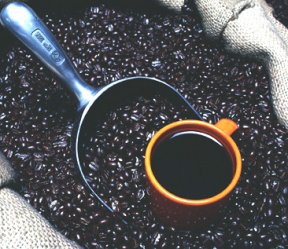Caffeinated Liver Defense
What you drink may greatly affect your vulnerability to potentially life-threatening liver disease, a new study finds.

The liver, the body’s largest solid organ, is a metabolic workhorse. It not only makes a host of proteins and blood-clotting factors, but also synthesizes and helps break down fats, secretes a substance that helps the body absorb fat and fat-soluble vitamins, and detoxifies many potential poisons.
Several circumstances can injure this vital organ, says James E. Everhart, an epidemiologist with the National Institute of Diabetes and Digestive and Kidney Diseases. Excessive alcohol consumption can do it. “Obesity, diabetes, and high iron levels [in blood] have also been associated with clinical liver disease,” he adds.
All that’s why this physician was pleasantly surprised by the results of his new study in the December 2005 Gastroenterology. It showed a protective effect from coffee and tea. People who routinely drank more than two cups of coffee or tea per day faced only half the risk of being hospitalized with cirrhosis and other types of serious liver disease as did people consuming less of these drinks. The data, collected as part of a federal survey of a cross-section of U.S. adults, spanned roughly 20 years and included 9,849 people.
Everhart points out that the benefits were limited to people at high risk of liver disease. However, with roughly one-third of U.S. adults obese and 7 percent battling diabetes, the at-risk population is anything but small.
Is it the caffeine?
Everhart and Constance E. Ruhl of a Washington, D.C.–area public health–consulting company, analyzed reported consumption patterns of coffee, tea, and other caffeinated substances—such as certain soft drinks and chocolate—for people who participated in the first National Health and Nutrition Examination Survey (NHANES-I). For this decades-long project, federally funded researchers assessed the health of people when they were first recruited, between 1971 and 1975, and again on four separate occasions into the early 1990s.
The researchers identified people who had been hospitalized for or died from liver disease during the follow-up period and compared their earlier reported consumption of caffeinated beverages with that of people who hadn’t had liver disease serious enough for hospitalization. The comparison revealed no effect from caffeine. However, the researchers then restricted their analysis to people at high risk of liver disease, such as those who were seriously overweight or had diabetes, were over 40, or reported downing at least one alcoholic drink per day.
Among these people overall, the risk of death or hospitalization from liver disease during the 20-year follow-up was 1.4 percent. However, among people who drank less than a cup of coffee or tea per day, the risk was 1.8 percent, and among study participants drinking one to two cups per day, the risk was 1.6 percent. Among people drinking even more of the beverages, the risk of serious liver disease was just 1.1 percent.
No effect on liver disease emerged among people drinking only decaf coffee, instant coffee, herbal teas, or cola. Data on these sources became available only in an early-1980s follow-up survey of the participants. However, when caffeine from all sources—including colas and chocolate—was summed, a related pattern took shape: Risk of liver disease dropped as total caffeine consumption climbed. Everhart notes that coffee consumption dominated these caffeine-consumption totals.
Explains Everhart, the focus was on caffeine “because it’s the most well-known, metabolically active compound in coffees and teas. But it’s unclear that the new finding is due exclusively to caffeine—or even caffeine at all.” It’s possible, he says, that protection is being conferred by one or more other compounds present in these drinks.
Why look in the first place?
Over the past decade, a handful of studies have reported that among certain subsets of liver-disease patients—chiefly those with cirrhosis—heavy coffee consumption appeared protective. A host of additional studies found that abnormal liver-enzyme concentrations, usually indicative of liver disease, were more likely to show up in people who drank the least coffee.
Clearly, the studies suggested some type of liver protection by caffeine or coffee, Everhart says.
In an earlier test of this apparent trend, Ruhl and Everhart examined caffeine consumption and the results of blood tests in 6,000 adults who participated in the NHANES-III study, conducted between 1988 and 1994. They found that among people at high risk of liver disease, “consumption of coffee and especially caffeine” was linked to reduced risk of abnormal liver-enzyme activity. The researchers reported their findings in the January 2005 Gastroenterology and then moved on to the current study.
“I keep bugging my colleagues that they need to study this [coffee-tea-liver association] in a more rigorous way to find the potential mechanism of action for caffeine or other compounds in these beverages,” Everhart says. Indeed, he notes, with more than a decade of increasingly stronger hints that caffeinated beverages are beneficial, “we still have nothing but speculation about why they might be protective.”







